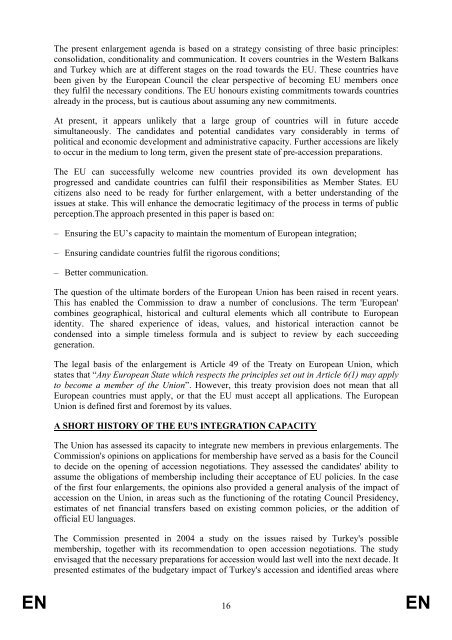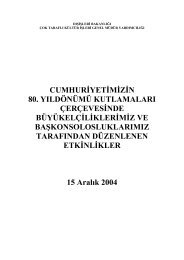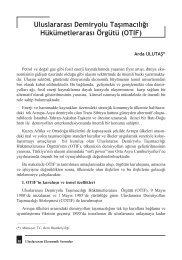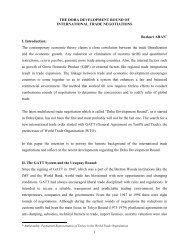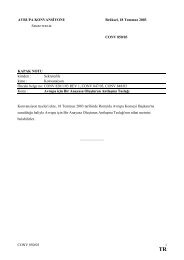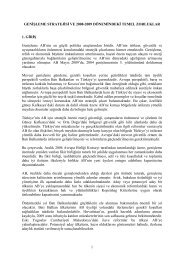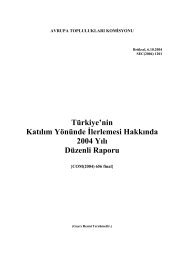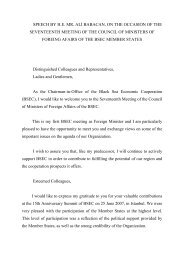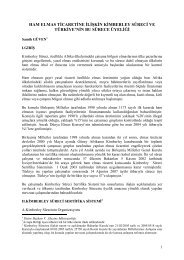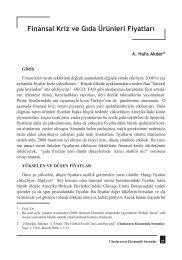Enlargement Strategy and Main Challenges 2006 - 2007
Enlargement Strategy and Main Challenges 2006 - 2007
Enlargement Strategy and Main Challenges 2006 - 2007
You also want an ePaper? Increase the reach of your titles
YUMPU automatically turns print PDFs into web optimized ePapers that Google loves.
The present enlargement agenda is based on a strategy consisting of three basic principles:<br />
consolidation, conditionality <strong>and</strong> communication. It covers countries in the Western Balkans<br />
<strong>and</strong> Turkey which are at different stages on the road towards the EU. These countries have<br />
been given by the European Council the clear perspective of becoming EU members once<br />
they fulfil the necessary conditions. The EU honours existing commitments towards countries<br />
already in the process, but is cautious about assuming any new commitments.<br />
At present, it appears unlikely that a large group of countries will in future accede<br />
simultaneously. The c<strong>and</strong>idates <strong>and</strong> potential c<strong>and</strong>idates vary considerably in terms of<br />
political <strong>and</strong> economic development <strong>and</strong> administrative capacity. Further accessions are likely<br />
to occur in the medium to long term, given the present state of pre-accession preparations.<br />
The EU can successfully welcome new countries provided its own development has<br />
progressed <strong>and</strong> c<strong>and</strong>idate countries can fulfil their responsibilities as Member States. EU<br />
citizens also need to be ready for further enlargement, with a better underst<strong>and</strong>ing of the<br />
issues at stake. This will enhance the democratic legitimacy of the process in terms of public<br />
perception.The approach presented in this paper is based on:<br />
– Ensuring the EU’s capacity to maintain the momentum of European integration;<br />
– Ensuring c<strong>and</strong>idate countries fulfil the rigorous conditions;<br />
– Better communication.<br />
The question of the ultimate borders of the European Union has been raised in recent years.<br />
This has enabled the Commission to draw a number of conclusions. The term 'European'<br />
combines geographical, historical <strong>and</strong> cultural elements which all contribute to European<br />
identity. The shared experience of ideas, values, <strong>and</strong> historical interaction cannot be<br />
condensed into a simple timeless formula <strong>and</strong> is subject to review by each succeeding<br />
generation.<br />
The legal basis of the enlargement is Article 49 of the Treaty on European Union, which<br />
states that “Any European State which respects the principles set out in Article 6(1) may apply<br />
to become a member of the Union”. However, this treaty provision does not mean that all<br />
European countries must apply, or that the EU must accept all applications. The European<br />
Union is defined first <strong>and</strong> foremost by its values.<br />
A SHORT HISTORY OF THE EU'S INTEGRATION CAPACITY<br />
The Union has assessed its capacity to integrate new members in previous enlargements. The<br />
Commission's opinions on applications for membership have served as a basis for the Council<br />
to decide on the opening of accession negotiations. They assessed the c<strong>and</strong>idates' ability to<br />
assume the obligations of membership including their acceptance of EU policies. In the case<br />
of the first four enlargements, the opinions also provided a general analysis of the impact of<br />
accession on the Union, in areas such as the functioning of the rotating Council Presidency,<br />
estimates of net financial transfers based on existing common policies, or the addition of<br />
official EU languages.<br />
The Commission presented in 2004 a study on the issues raised by Turkey's possible<br />
membership, together with its recommendation to open accession negotiations. The study<br />
envisaged that the necessary preparations for accession would last well into the next decade. It<br />
presented estimates of the budgetary impact of Turkey's accession <strong>and</strong> identified areas where<br />
EN 16 EN


